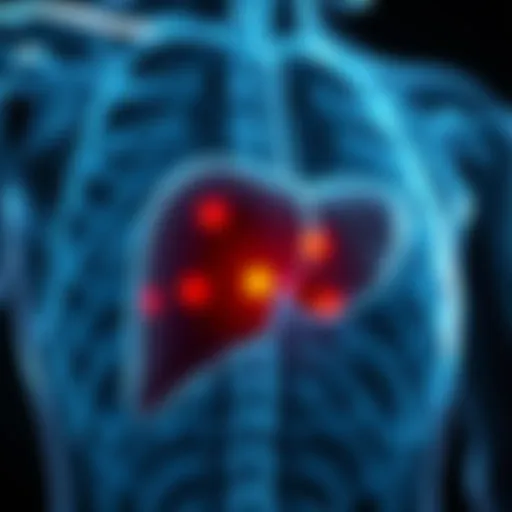Leptin Hormone and Weight Loss: An In-Depth Analysis


Intro
In the complex tapestry of weight management, few players are as significant as hormones. Among these, leptin stands out, particularly due to its pivotal role in balancing energy expenditure and appetite regulation. While many individuals may overlook the intricate mechanisms underlying weight loss, understanding leptin is paramount.
This article aims to peel back the layers shrouding this crucial hormone, delving into its physiological intricacies and addressing how it interacts with various body systems. We’ll explore not just the basics, but real-life implications tied to leptin, such as resistance and dietary influences, thereby helping readers grasp the broader context of obesity and weight loss efforts.
Key Concepts
Definition of Primary Terms
Leptin is a hormone predominantly produced by adipose (fat) tissue. Its primary functions include signaling the brain to suppress hunger and regulating energy balance. When fat stores increase, leptin levels rise, signaling to the brain that enough energy is available. Conversely, decreased fat reserves lower leptin levels, prompting hunger signals. In simpler terms, think of leptin as the body's own little messenger, alerting you when to eat and when to stop.
Understanding other terms related to leptin enriches this discussion:
- Leptin Resistance: A condition where the brain doesn't respond effectively to leptin signals, often leading to increased appetite and weight gain, even when leptin levels are high.
- Hypothalamus: The brain region that plays a crucial role in regulating hunger and energy expenditure, influenced directly by leptin levels.
Related Concepts and Theories
The relationship between leptin, appetite, and body weight isn't isolated. Various interconnected factors come into play:
- Insulin: Produced by the pancreas, insulin also impacts fat storage and metabolism, often interacting with leptin signals.
- Ghrelin: Sometimes referred to as the "hunger hormone," ghrelin works inversely to leptin and directly stimulates appetite.
- Energy Homeostasis: A state where energy intake meets energy expenditure, largely mediated by leptin and the hypothalamus.
"Leptin not only controls hunger; it underscores a delicate balance in the body's approach to energy management."
As we explore more, it’s evident that leptin doesn’t just operate in a vacuum. This intricacy is vital to understand for anyone diving deep into the science of weight loss and regulatory mechanisms.
Future Directions
Gaps Identified in Current Research
While much is known, there remain areas ripe for exploration. Current research illustrates several gaps:
- Long-term Effects of Leptin Therapy: Although there is burgeoning interest in using leptin for weight management, data on the long-term efficacy and safety of such approaches remains limited.
- Diversity in Response: Why do some individuals exhibit leptin resistance while others do not? The genetic and environmental factors that contribute to this discrepancy need further investigation.
Suggestions for Further Studies
Possible future research could delve into:
- The impact of specific diets on leptin levels and sensitivity.
- The role of lifestyle factors, such as sleep and stress, on leptin dynamics.
- Exploring the intricate interplay between leptin and other hormones that regulate metabolism.
By addressing these gaps, scientific understanding can evolve, paving new ways to meet the challenges posed by obesity and weight mismanagement.
Through careful investigation and a commitment to unraveling the complexities of leptin, we can better equip ourselves to tackle some of the most pressing health concerns of our time.
Prologue to Leptin
Exploring the significance of the leptin hormone offers a window into the intricate interplay between hormones, energy regulation, and body weight. Leptin, predominantly produced by adipose (fat) tissue, plays a pivotal role in communicating the body's energy status to the brain. Understanding this hormone is key not just for academic pursuits but also for practical dietary and health implications.
The investigation of leptin is particularly relevant for those grappling with obesity and weight management. As a hormone that signals satiety and energy expenditure, leptin directly influences eating behavior and metabolic processes. The intricacies of this hormone's action delve deep into the body’s regulatory systems, illuminating how energy balance can be disturbed and highlighting risks associated with leptin resistance.
Definition of Leptin
Leptin is a peptide hormone composed of 167 amino acids, playing a crucial role in fat metabolism and appetite regulation. Its primary function revolves around sending signals regarding the amount of stored fat in the body to the hypothalamus, a part of the brain that controls hunger and energy expenditure. When fat stores increase, leptin levels rise, signaling the brain to reduce appetite and promote energy usage. Conversely, when fat stores decline, leptin levels decrease, which can increase hunger.
In simple terms, think of leptin as a messenger that carries vital information about the body's energy reserves. This communication is essential for maintaining homeostasis, ensuring that energy intake and expenditure are balanced.
Discovery and Historical Context
Leptin was first discovered in 1994 by a group of researchers led by Jeffery Friedman at the Rockefeller University. It was identified in the course of studies involving genetically modified mice that were obese due to a mutation affecting the production of leptin. The pivotal finding that this hormone could regulate body weight and fat mass was groundbreaking.
Before leptin’s discovery, the understanding of weight regulation mechanisms was largely limited and often oversimplified. In fact, the notion of a specific hormone regulating appetite hadn't yet gained traction. Early research primarily concentrated on other factors affecting energy balance, such as insulin. The arrival of leptin in the scientific lexicon marked a turning point, sparking significant interest in how endocrine functions impact obesity and appetite control.
Since its discovery, leptin has been studied extensively, leading to numerous investigations exploring its association with various health conditions, including obesity, diabetes, and metabolic syndromes. Studies have shown the complexity inherent in leptin’s functions—its efficacy can be influenced by various factors and may be compromised in certain populations.
Physiological Role of Leptin


Leptin, the so-called satiety hormone, plays a pivotal role in maintaining energy homeostasis within the human body. This hormone, produced mainly by adipose (fat) tissue, acts as a signal to the brain regarding the body's energy reserves. Its crucial function is to regulate appetite and energy expenditure, effectively trimming the sails of weight management. Understanding the physiological role of leptin is essential not just for grasping its impact on weight loss but also for appreciating its broader effects on our metabolism.
Leptin and Energy Homeostasis
At its core, leptin is intricately connected to how our bodies manage energy. When fat stores are plentiful, leptin levels increase, sending a strong message to the brain to curb appetite and increase energy expenditure. Conversely, during periods of low energy reserves—such as fasting or severe calorie restriction—leptin levels drop, which can trigger hunger and reduce metabolic rate. This feedback loop is vital in ensuring that the body maintains a balance, keeping energy intake and expenditure in check.
But it's not just a simple one-way street. Various factors including genetics, environment, and lifestyle choices can significantly influence leptin signaling. When leptin works as expected, individuals can maintain a stable weight. However, when this system is disrupted, it opens the floodgates to potential weight gain and obesity. This is where leptin resistance often complicates matters, making it harder for individuals to respond to the natural signals that leptin provides.
"Leptin's message is clear: when the body is well-fed, it's time to cut back on those extra calories. But when leptin resistance sets in, the signals become muddled, leading to confusion in appetite regulation."
Leptin's Impact on Appetite Regulation
Leptin’s role doesn’t stop at energy homeostasis; it heavily influences oral appetite as well. When it reaches the hypothalamus—a region in the brain responsible for hunger control—it interacts with various neuropeptides and hormones to either stimulate or suppress appetite. For instance, high leptin levels inhibit neurons that produce the hunger hormone neuropeptide Y, thus reducing cravings. On the flip side, it activates those neurons that promote satiety.
This mechanism illustrates why individuals with higher fat mass tend to have higher levels of leptin. You'd assume these elevated levels would lead to less appetite, yet many find themselves hungry, showing how leptin resistance can dampen this hormonal message. The result is a paradox: the body is fat-rich yet remains hungry, a cycle that’s hard to break.
In practical terms, understanding this relationship could be a game-changer in weight loss strategies. By focusing on ways to improve leptin sensitivity—such as adopting a balanced diet, getting regular exercise, and managing sleep—individuals might improve their appetite control. This could lay a more stable foundation for effective weight management strategies that are not solely reliant on caloric restriction.
In summary, the physiological role of leptin is multifaceted and far from straightforward. It's not just a signal to stop eating; it's a critical player in the broader narrative of energy regulation and weight management. The complexities of this laughter-inducing relationship between appetite, energy balance, and hormonal feedback highlight just how indispensable leptin is in the quest for weight loss and overall health.
Leptin Resistance: Mechanisms and Impact
Leptin resistance remains a pivotal topic within the conversation surrounding leptin's role in weight management. This phenomenon, wherein the brain becomes less sensitive to leptin's signals despite high levels of the hormone in circulation, poses significant challenges for those struggling with obesity and weight loss. Understanding how this resistance develops and its consequences is crucial, especially for healthcare professionals and researchers devoted to tackling obesity-related issues.
Understanding Leptin Resistance
Leptin resistance can occur due to multiple factors, both biological and external. For starters, chronic inflammation in the body has been implicated as a key player. When tissues become inflamed, it can interfere with leptin signaling. Additionally, excessive fat accumulation itself may play a role; as fat cells multiply, they release leptin, but eventually, the body's receptors may begin to ignore these signals.
Some researchers have also pointed to genetics as an underlying factor in the development of leptin resistance, suggesting that certain inherited traits could predispose individuals to this condition. Environmental factors, such as a diet high in unhealthy fats and sugars, can also exacerbate leptin resistance. These foods contribute not only to inflammation but also to hormonal dysregulation. That said, it’s vital to understand that leptin resistance isn't simply about the quantity of fat in the body but rather how the body responds to that fat.
Moreover, stress and lack of sleep have been shown to have a damaging effect on leptin sensitivity. When stress levels rise, the body produces more cortisol, which can further impede leptin’s effectiveness. All these elements intertwine, creating a marked impact on an individual’s ability to lose weight, no matter how diligent they are in their efforts.
Consequences of Leptin Resistance on Weight Loss
The implications of leptin resistance are severe and multifaceted. The primary consequence is that it hinders weight loss, creating a frustrating cycle for individuals trying to shed pounds. While their bodies may produce ample leptin, the brain fails to receive the message to stop eating or to utilize energy efficiently, leading to increased hunger and decreased metabolic rate. This can make a weight loss journey feel like climbing a mountain in a fog—stumbling and unable to see the top.
In addition, leptin resistance can have broader health implications, as it is often associated with various metabolic disorders. Individuals with long-term leptin resistance may find themselves facing issues like type 2 diabetes, cardiovascular problems, and even certain types of cancer. Thus, addressing the problem of leptin resistance is not merely about weight loss; it’s fundamentally about broader health and well-being.
"When the brain becomes resistant to leptin, it doesn’t just hinder weight loss; it opens the door to a myriad of health complications."
In summary, the mechanisms of leptin resistance are complex and influenced by both internal and external factors. The consequences of such resistance are evident in the struggle many face during weight loss efforts. Recognizing the need for tailored approaches that address these mechanisms is essential in advancing both individual health outcomes and public health strategies regarding obesity management.
Leptin and Other Hormonal Interactions
Understanding the complex interactions between leptin and other hormones is crucial for grasping its full impact on weight loss and overall metabolic health. This section will delve into how leptin does not work in isolation; instead, it dances in a delicate balance with hormones like ghrelin and insulin. Both of these hormones significantly influence appetite and energy expenditure, making their relationship with leptin pivotal. Knowing these dynamics not only gives insight into weight management strategies but also highlights considerations for lifestyle choices involving diet and exercise.
Leptin's Relationship with Ghrelin
Leptin and ghrelin serve as the yin and yang of appetite regulation. While leptin primarily signals satiety, ghrelin is often referred to as the hunger hormone, stimulating appetite when the stomach is empty. When functioning properly, they work together to maintain energy homeostasis. However, the tug-of-war between these hormones can lead to complications, especially in the context of obesity.
Research has shown that elevated levels of leptin, often seen in obese individuals, do not correlate with reduced hunger. This is where ghrelin makes the scene. High ghrelin levels can be triggered by stress, irregular eating habits, or lack of sleep, all of which can skew the leptin-ghrelin balance, leading to increased appetite and subsequent weight gain.
Here’s a quick rundown of how these hormones interact:
- Leptin decreases ghrelin production, signaling fullness to the brain.
- Ghrelin increases when the stomach is empty, prompting a search for food.
- Obese individuals often have high leptin but also an unchecked level of ghrelin, creating a paradox.
In simpler terms, when you’re overfed but still hungry, leptin is acting more like a whisper, while ghrelin is shouting. The balance between these two hormones dictates not just how much we eat but also how our bodies process energy.
Influence of Insulin on Leptin Levels
Insulin, the hormone responsible for glucose regulation, also plays a significant role in leptin’s functionality. When you consume carbohydrates, insulin levels rise to help process the glucose. Interestingly, insulin has a direct effect on leptin release from the adipose (fat) tissue. Higher insulin levels generally lead to an increase in leptin secretion. However, this relationship also has its quirks.
- Insulin Resistance: In cases of insulin resistance, often observed in overweight or obese individuals, the body produces more insulin to achieve the same glucose-lowering effects. The heightened insulin might lead to further leptin resistance, disrupting the satiety signals again.
- Dietary Factors: High-sugar diets can lead to insulin spikes, which may elevate leptin levels but do not guarantee better appetite control. It's a tightrope walk.
- Inconsistency in Response: Some studies indicate that while insulin can be a leptin booster, its prolonged elevation can paradoxically cause leptin levels to be less effective at regulating hunger, fostering a cycle of overeating.
"Hormones like leptin and insulin are not just players in a singular drama; they are part of an ensemble where each one’s role can influence the others in unpredictable ways."


Conclusion surrounds these interactions underlines a need for comprehensive approaches when targeting weight loss and management strategies. It is important to consider that these hormonal dances are influenced by lifestyle, dietary choices, and other physiological factors. Understanding how they relate paves the way for better therapeutic interventions and lifestyle adjustments aimed at promoting healthy weight loss.
Lifestyle Factors Affecting Leptin Levels
Understanding how lifestyle factors influence leptin levels is crucial for anyone seeking to manage weight effectively. Leptin, as we've explored, plays a vital role in appetite regulation and energy balance. Hence, factors like diet and physical activity can significantly modulate leptin's effects on the body.
The Role of Diet in Modulating Leptin
Diet is arguably one of the most prominent factors that can influence leptin levels. What we eat not only provides energy but also affects how our body produces hormones like leptin. For instance, diets rich in processed foods, high in sugar, and low in nutrients can lead to an imbalance in leptin signaling, often resulting in increased appetite and weight gain.
- Nutrient Density: Consuming a diet rich in whole foods, including vegetables, fruits, lean proteins, and healthy fats, can enhance leptin sensitivity. These foods help promote a feeling of fullness while providing essential nutrients that may aid in hormonal balance.
- Omega-3 Fatty Acids: Foods like fatty fish, chia seeds, and walnuts are beneficial for leptin regulation. Research suggests that omega-3s can enhance leptin sensitivity, possibly reducing hunger and aiding weight loss efforts.
- Fiber Intake: High-fiber foods, such as whole grains and legumes, can support leptin production and assist in regulating appetite. Fiber slows digestion, leading to increased satiety after meals, which may help in controlling calorie intake.
On the contrary, high-glycemic index foods, like white bread and sugary drinks, can promote insulin resistance. Insulin plays a role in leptin signaling, and when insulin levels are irregular, leptin can become less effective at regulating hunger. In short, the composition of one’s diet can either support or hinder leptin's ability to maintain energy balance.
Physical Activity and Leptin Sensitivity
Physical activity is another critical component that affects leptin levels. Engaging in regular exercise can enhance leptin sensitivity, making the hormone more effective at signaling satiety and energy status to the brain.
- Aerobic Exercise: Activities like running, swimming, and cycling boost metabolic rate and promote fat loss, which can positively influence leptin sensitivity. Studies have shown that individuals who maintain an active lifestyle typically have better leptin regulation.
- Strength Training: Incorporating weightlifting into weekly routines doesn’t just build muscle but also improves the body’s hormonal environment. This training can contribute to fat loss and improve insulin sensitivity, which in turn supports more effective leptin signaling.
- Sedentary Lifestyle Effects: Conversely, prolonged periods of inactivity can lead to disruptions in lepti signaling. Sitting for extended times may exacerbate insulin resistance, contributing to dysfunctional leptin responses and increased appetite.
"Regular exercise not only sculpts your physique but also fine-tunes your hormonal responses, helping your body utilize leptin more effectively."
In summary, lifestyle choices regarding diet and physical activity play a pivotal role in managing leptin levels. Taking steps to eat nutrient-dense foods while engaging in regular exercise can foster a better balance of leptin, ultimately influencing weight management and overall health. This understanding opens up avenues for targeted interventions for those struggling with leptin-related issues.
Potential Therapies Targeting Leptin Dynamics
Understanding the nuances of leptin and its mechanisms is paramount in the journey toward addressing obesity and weight management. While much focus has been set on the role of diet and exercise in handling weight, the exploration of therapies that directly target leptin dynamics opens new avenues for treatment options. These potential therapies aim not only to regulate leptin levels but also to mitigate the effects of leptin resistance, which can complicate weight loss efforts. By examining pharmacological interventions and the promise of leptin-based treatments, one can grasp the multifaceted approach necessary for holistic weight management strategies.
Pharmacological Interventions
Pharmacological interventions that influence leptin signaling and expression have been at the forefront of research. These medications seek to either enhance leptin sensitivity or adjust the levels of the hormone in the body to promote effective weight loss. Some noteworthy considerations include:
- Leptin Analogues: These synthetic versions of leptin could provide an option for those with leptin deficiencies, potentially restoring balance in energy regulation.
- Leptin Mimetics: Compounds that mimic leptin’s actions can assist in areas where natural leptin interactions are insufficient due to resistance, which is common in many obese individuals.
- Combination Therapies: There is a growing interest in combinations of leptin-targeting drugs with others that affect metabolism or appetite, such as GLP-1 receptor agonists. This may lead to a more comprehensive management of weight and metabolism issues.
The potential for these pharmacological avenues paints a promising picture for individuals struggling with weight management, but they come with caveats such as potential side effects and the need for consistent monitoring.
The Promise of Leptin-based Treatments
The outlook for leptin-based treatments is geared toward creating more personalized medicine solutions for obesity.
One of the exciting prospects lies in developing therapies that enhance the brain's ability to respond to leptin signals, given that many cases of obesity are complicated by leptin resistance. Research indicates that manipulating central nervous system pathways can rejuvenate leptin sensitivity, leading to better appetite control and food intake regulation.
Moreover, as scientists delve deeper into the genetic basis of leptin function, discovering variations that may affect individual responses to leptin therapy could usher in more tailored treatments. This customization could transform how metabolism and weight are managed on an ongoing basis.
"The future of obesity therapy might not be in restrictive diets, but in enabling the body's hormonal signals to function effectively again."
By embracing these potential developments, we can look forward to more nuanced and effective strategies tailored to individual needs in the realm of weight management.
The Connection Between Leptin and Weight Management
Understanding leptin's role in weight management is crucial, as it serves as a centerpiece in the intricate web of metabolic processes. This hormone is not merely a messenger but a central player that offers insights into how our bodies regulate not just appetite, but overall energy balance. The relationship between leptin and weight management encompasses various dimensions, including its influence on metabolic pathways, the context of weight loss success, and the delicate balance that needs to be maintained for effective weight management.
Leptin's Influence on Weight Loss Success
Leptin has a profound influence on weight loss successes observed in many individuals. When our body fat percentage decreases, leptin levels can likewise decline, signaling the brain to increase hunger and reduce energy expenditure. By this logic, a reduction in leptin can lead to feelings of deprivation, making the weight loss journey seem like pushing a boulder uphill.
Research indicates that higher leptin levels correlate with a greater success rate in weight loss. When individuals manage to improve their body composition and subsequently their leptin sensitivity, they may experience reduced hunger and increased satiety.
- Key points about leptin in relation to weight loss success include:
- Caloric restriction and leptin levels: When one undergoes caloric restriction, weight loss is accompanied by declining leptin levels. Thus, one must consider adaptations to hunger signals after a significant weight loss.
- Leptin sensitivity and effective weight loss: Individuals who are sensitive to leptin maintain regulated appetite and metabolic rate, leading to more sustainable weight management.
- Psychological factors: The relationship between leptin fluctuations and mood can also play a role; fluctuations in leptin can contribute to emotional eating or cravings, complicating the weight loss process.
The complexity of leptin's function suggests that successful weight loss is not just about reducing calorie intake, but also about understanding hormonal behavior and sensitivity.
Balancing Leptin for Effective Weight Management


Striking the right balance in leptin levels is essential for effective weight management. Maintaining this balance can be the elusive golden egg for many struggling with their weight. Healthy leptin levels signal the body to comprehend its fat reserves appropriately, thus averting excessive hunger and regulating energy expenditure.
To balance leptin levels, consider the following factors:
- Dietary choices: Foods rich in fiber, protein, and healthy fats can help maintain appropriate leptin levels. Conversely, diets high in refined sugars and processed foods can disrupt leptin signaling.
- Regular physical activity: Exercise enhances leptin sensitivity. Engaging in both aerobic and resistance training has been shown to positively influence the body’s response to leptin.
- Sleep quality: Poor sleep can lead to imbalances in hormones, including leptin. Lack of sleep may elevate levels of ghrelin, the hunger hormone, which may overpower leptin's effects.
- Stress management: Chronic stress affects leptin levels. Finding effective stress management techniques can support balanced leptin release by promoting overall hormonal harmony.
Controversies Surrounding Leptin Research
Leptin research has been quite the hot potato among scientists and health professionals alike. While many understand its role in energy balance and appetite regulation, the uncertainties surrounding its practical application in obesity treatment have sparked much debate. This section dissects the various controversies, shines a light on the ongoing discussions, and delves into misconceptions that might muddle up the understanding of leptin's functionality in weight management.
Debates on Leptin's Efficacy in Obesity Treatment
One of the primary conversations revolves around whether leptin can be effectively utilized for treating obesity. Despite being hailed as a "weight loss hormone" when it was first discovered, later studies raised eyebrows about its efficacy in real-world scenarios. Some researchers argue that simply increasing leptin levels through supplementation might not be the silver bullet for obesity that many had hoped for. In fact, high leptin levels often accompany obesity, which leads to a curious paradox.
Key points in this debate include:
- Leptin Resistance: Many obese individuals exhibit leptin resistance, which means their bodies do not respond to leptin as they should. They have high leptin levels, but their brains don't get the message that they are full. This phenomenon raises questions about how effective treatment can be if the very hormone in question is rendered ineffective.
- Variability Among Individuals: Research suggests that leptin levels vary significantly from person to person, influenced by genetic, environmental, and lifestyle factors. This variability complicates the notion of a one-size-fits-all solution for obesity.
- Potential Side Effects: Concerns have also been raised regarding the long-term implications of leptin therapy. Hormonal balance is delicate, and altering it could lead to unintended consequences elsewhere in the body.
Misunderstandings About Leptin's Role
Misunderstandings about leptin's function abound in both academic circles and popular media. A baseline lack of clarity can easily skew public perception and lead to ineffective weight management strategies. A few common misconceptions include:
- Leptin as a Weight Loss Drug: Many believe that if they increase leptin levels, they will surely lose weight. But, as already mentioned, high leptin doesn't necessarily equal low body fat. Misinterpreting leptin's role could lead to frustration for those trying to shed pounds.
- Simplicity of Leptin Dynamics: Some oversimplify the mechanisms, treating leptin as the "magic bullet." Weight regulation is multi-faceted, involving enzymes, other hormones, and metabolic pathways. Leptin is certainly important, but it doesn’t operate in a vacuum.
"Understanding leptin’s role requires recognizing its context within broader physiological changes and individual variability."
- Confusing Leptin with Ghrelin: Another common error involves conflating leptin with ghrelin—the so-called hunger hormone. While leptin signals satiety, ghrelin stimulates appetite. Misunderstanding the balance between these two hormones can lead to misguided dietary choices or weight loss strategies.
Through illuminating the complexities and controversies surrounding leptin, one can start to appreciate the hormone's place in the expansive landscape of weight management. Future research must aim at distilling clear paths forward, to both unravel the mysteries of leptin and harness its potential without falling prey to the pitfalls of misunderstanding.
Future Directions in Leptin Research
The exploration of leptin research is crucial as it offers potential breakthroughs for understanding obesity and weight regulation. The intricate relationship between leptin, appetitite, and energy balance suggests that there is still much to uncover about this hormone. As research evolves, the focus will shift toward refining current therapeutic approaches and exploring novel strategies that could help tackle obesity more effectively.
Exploring Novel Therapeutic Avenues
Researchers are keen on identifying new therapeutic interventions that can enhance leptin's effectiveness. One promising area involves the development of leptin analogs. These are synthetic versions that could mimic the hormone's function, potentially overcoming issues related to resistance. This could lead to targeted treatments, customized to individual patients based on their unique leptin profiles.
Further investigation into compounds that can sensitize tissues to leptin may reveal new pathways to improve its signaling. This understanding might pave the way for combination therapies, integrating leptin with other metabolic influencers like insulin or even gut hormones. The goal here is not only to understand how these hormones interact but also to leverage their relationships to create a more comprehensive weight loss strategy.
Integrating Leptin Research with Other Fields
Leptin's role does not exist in isolation; integrating research from other fields is vital for a holistic approach. For instance, the connection between leptin and the microbiome is an emerging area of interest. Gut health could significantly affect leptin levels and resistance, suggesting that a deeper understanding of gut bacteria could provide novel insights into weight management.
Additionally, combining insights from genetics and epigenetics may refine our understanding of individual differences in leptin response. If researchers can identify specific genetic markers that predict leptin resistance, personalized medicine might become a reality in treating obesity. This cross-disciplinary approach not only enriches leptin research but also creates a network of knowledge that can address complex issues surrounding weight management.
"The future of leptin research may very well hinge on our ability to synthesize knowledge from diverse scientific domains to formulate comprehensive therapeutic strategies."
By delving into these avenues, the scientific community can build a nuanced understanding that synthesizes the intricate roles of leptin. This approach has the potential to deliver more effective interventions for obesity, underlining the importance of expanding research in this sphere.
Finale
The conclusion serves as a pivotal element in this discourse about leptin and its relationship to weight loss. It synthesizes the various threads woven throughout the article, allowing readers to grasp the salient points regarding leptin's role in energy regulation and appetite control. By highlighting the complexity surrounding leptin dynamics, the conclusion underscores the importance of understanding both the physiological mechanisms and the potential impact of lifestyle factors, such as diet and physical activity, on leptin levels.
In particular, the intricacies of leptin resistance are crucial. As obesity rates continue to climb, recognizing how leptin’s signaling can become disrupted offers essential insights into the challenges many face in weight management. The conclusion not only recaps key findings but outlines what these findings imply for individuals pursuing weight loss and health initiatives.
Furthermore, the conclusion touches upon the future implications of leptin research. With ongoing investigations into new therapeutic avenues and the potential for leptin-based treatments, the dialogue remains robust. Therefore, this section empowers readers by summarizing the comprehensive findings and encouraging them to view leptin as a piece of a larger jigsaw puzzle in the understanding of obesity and weight management.
Summary of Key Insights
The exploration of leptin in this article reveals several insightful takeaways:
- Leptin is central to energy homeostasis, impacting not only appetite but also metabolic processes that govern weight balance.
- The phenomenon of leptin resistance plays a critical role in obesity, impeding the hormone's ability to effectively regulate body weight.
- Dietary choices and physical activity significantly influence leptin levels, offering practical avenues for weight loss strategies.
- There is a growing interest in pharmacological interventions aimed at leveraging leptin’s properties, along with the necessity for more nuanced research to address existing misconceptions.
- Integration of multidisciplinary approaches in leptin research could open new pathways for understanding obesity.
Implications for Future Research and Practice
The implications of leptin research extend well beyond academic inquiry, shaping both clinical practice and everyday life for those grappling with weight issues. Key areas for future exploration include:
- Novel Therapeutics: Developing leptin-based therapies that can potentially mitigate obesity and enhance weight loss success.
- Personalized Approaches: Understanding individual variations in leptin response offers the potential for personalized diet and exercise regimens.
- Impact of Environment: Investigating how environmental factors, such as socio-economic status and access to healthy food, can affect leptin sensitivity and broader metabolic health.
- Cross-Disciplinary Integration: Collaborative research among endocrinologists, nutritionists, and behavioral scientists could yield holistic strategies to tackle obesity from multiple angles.
By fundamentally rethinking how the scientific community approaches leptin, and considering its vast implications for health and wellness, researchers can pave the way for more effective interventions to combat the obesity epidemic.



